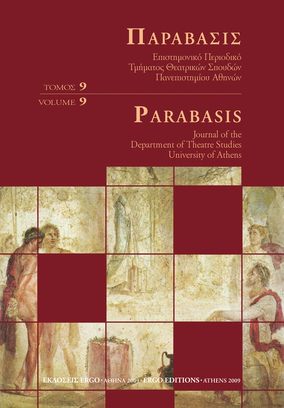Ο νεκρός αδελφός δεν πέθανε : είναι ακόμα μαζί μας
Part of : Παράβασις : επιστημονικό περιοδικό Τμήματος Θεατρικών Σπουδών Πανεπιστημίου Αθηνών ; Vol.7, No.1, 2006, pages 133-151
Issue:
Pages:
133-151
Parallel Title:
The dead brother has not died : he is still amongst us
Section Title:
Μελέτες και άρθρα
Author:
Abstract:
The idea of turning the plots of folk-songs into dramas started in Greece in the 19th century, when Spyridon Vassiliadis combined a folk ballad and an ancient story in his play Galatia with great success. Then Argyris Eftaliotis used one of the best ballads, The “Ballad of the Dead Brother”, spread in variations all over the Balkans and Central Europe, to write his play Vampire in 1892, by which he wanted to create a model for modern Greek drama. Although Eftaliotis’s Vampire did not have a stage career, it inspired many successive playwrights to follow his example and three of them to use the same ballad. The next to write a Vampire was Fotos Politis in 1908. This Vampire also was not staged: Politis sent it to a drama competition of the university and won the second prize. The play was lost and was only recently discovered. The third drama based on the same ballad was written in 1930 by Zacharias Papantoniou. Its title was The Oath of the Dead and contained some modem realistic elements, which the critics disliked. However it was a success with the audiences. The last to write a play about the “Dead Brother” was the writer-director Sotiris Chatzakis in 2000. He did not write an original text but composed a show like a collage, consisting of variations of the folk ballad, not only Greek but from other countries too and in other languages. It was staged like a ritual and was considered a great inter-Balkan show. It had a great success and was played for some years. All these dramatisations during more than a century, following the modern styles of the time of writing, show a remarkable vitality in the traditional legent, due perhaps to its metaphysical ambience and the strong family ties it presents.
Subject (LC):
Keywords:
παραδοσιακά τραγούδια, δραματουργία




